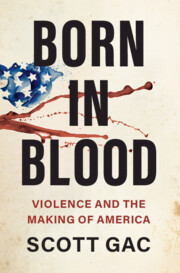Refine search
Actions for selected content:
3 results

Born in Blood
- Violence and the Making of America
-
- Published online:
- 18 January 2024
- Print publication:
- 18 January 2024
Epilogue
- from Part III - Modern Traditions
-
- Book:
- Born in Blood
- Published online:
- 18 January 2024
- Print publication:
- 18 January 2024, pp 266-269
-
- Chapter
- Export citation
Chapter 3 - Pieces of the Body Torn out by the Roots
- from Part I - Historical Materialism and the Materials of History
-
- Book:
- Poetry and the Limits of Modernity in Depression America
- Published online:
- 21 September 2023
- Print publication:
- 05 October 2023, pp 72-92
-
- Chapter
- Export citation
